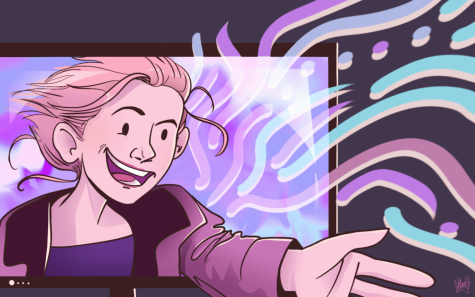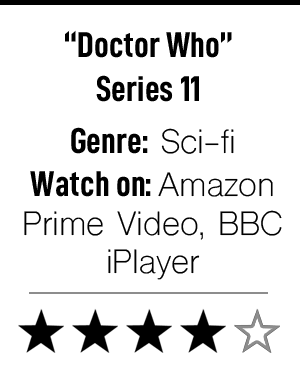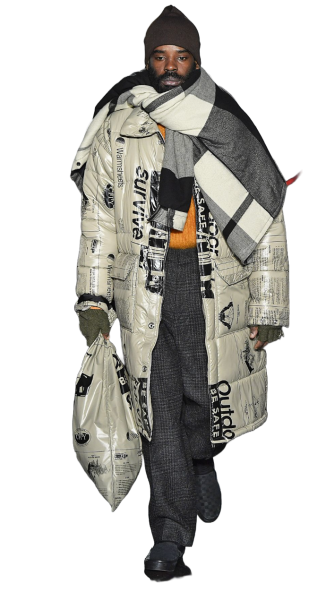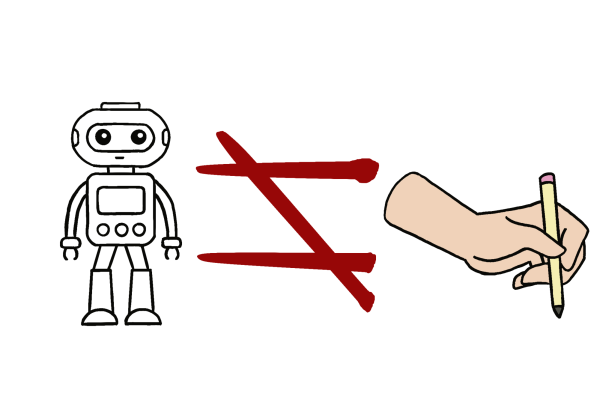Change, and not a moment too soon
For all its recent transformations, ‘Doctor Who’ has pleasingly circled back to its origins

The latest season of “Doctor Who” features an entirely new cast, including, for the first time, a woman (Jodie Whittaker) playing the titular character, the Doctor.
The scene opens with a 19-year-old named Ryan trying to figure out how to ride a bike, all the while glowering at his new step-granddad. From his grandmother’s exasperated chiding to the part where Ryan flings his bike off a cliff in a moment of frustration, it looks, for all intents and purposes, like a normal show.
That is, right until the giant blue Hershey Kiss appears and a woman falls out of the sky, slightly on fire. The Hershey Kiss? Alien. The woman? Also an alien.
This is no longer surprising when you consider the context: “Doctor Who” is a 55-year-old science fiction show about a traveler from another world called “The Doctor,” who explores time and space with (usually human) friends, or “companions.” The show’s longevity is down to the fact that in situations in which a person would normally die, the Doctor simply changes bodies.
The most recent such shakeup took place last year, with the Twelfth Doctor regenerating into the Thirteenth (Jodie Whittaker). And along with the obvious fact that a different person is playing the show’s titular character, there’s something else that’s striking about Series 11 — it’s that Whittaker, out of a 13-person lineup, is the first woman to play the Doctor.
Not to mention, this latest season of the show has a new set of companions, new showrunner and even a new musical composer. Everything’s changed, not just the Doctor themself, and that, of course, lends itself to an air of revival, as though the show itself has started over from scratch. And, in a way, that’s perfect, because new viewers can dive right in without being bogged down by half a century of science fiction lore.
Yet this disconnect from previous seasons has extended into the structure of the show itself — fewer episodes, no appearances from previously-established villains and even no overarching plot. With no clear series arc this time around, Series 11 feels like it’s been intrepidly exploring the universe with no sense of direction, especially amidst the variety of other shows on television that do have seasonal plotlines.
Where the overall cohesion lacks, however, the show makes up for with its characters. The three new companions — Ryan (Tosin Cole), his granddad Graham (Bradley Walsh) and his friend Yasmin (Mandip Gill) — are all constructed right in front of audience’s eyes, rather than being pre-established characters with hours of backstory to sift through.
Moreover, their personalities and beautifully mundane, regular lives truly shine through after several seasons of companions’ lives becoming inextricably tangled with the fantastic. There are no companions with complicated destinies regarding the Doctor — rather, they’re much more ordinary.
As for the Doctor herself, Jodie Whittaker takes to the iconic role with an absolutely clear sense of glee, feeling like both a fresh new character and someone incredibly familiar all at once. There is a definite manic exuberance there reminiscent of the Doctor’s previous incarnations, although I have to say, the character’s darker side has been delved into less. Thirteen, however, definitely has a strong penchant for the maudlin — the message of each episode is somewhat slapped in our faces every time through some sort of rousing speech.
Indeed, tonally, new showrunner Chris Chibnall is very much keeping in line with the optimism inherent in the show. But while the previous showrunner tended towards a darker shade of optimism, this new kind is brighter, more euphoric — less “we can find light in dark times” and more “there is light everywhere if you only open your eyes.” Every episode overflows with an oddly ebullient joy, but it’s refreshing after the patchy doom and gloom clouding some of the previous season.
But while Series 11 is unmistakably “Doctor Who,” it’s almost too carefully so. Several episodes, while enjoyable, feel painstakingly constructed so as to ruffle as few feathers as possible after the upheaval of a newly-female protagonist.
As a matter of fact, this issue seems solely limited to the “science fiction” episodes. Not bad by any means — “Kerblam” was a classic space romp (with bonus space Amazon), while “The Tsuranga Conundrum’s” host of ensemble characters was charmingly in the vein of older sci-fi — but they were forgettable.
And that’s a major issue in a science fiction show.
On the other hand, every episode set in the past (and there have been an unprecedented amount this season) has been both unforgettable and, yes, feather-ruffling for that cohort of viewers already up in arms about the Doctor’s gender. From witch hunts in England to the civil rights movement in America to the partition of India, “Doctor Who” has finally figured out how to juggle its heavier historical episodes with the right amount of grace without sacrificing its good-hearted spirit.
The fact that this is the first time in the show’s half-century history that it’s had such a diverse set of writers shows in the scope of the historicals, with enough character-building levity and high-stakes tension to carry the plotlines racing forward — the true bogeyman of the hour, of course, being very real injustice rather than monsters made of bubble wrap. If there’s one area where the show is really barreling forward, it’s, ironically enough, in the past.
 Ultimately, however, for all the sweeping changes, Series 11 is really “Doctor Who” taking a page from its own origins. With a bigger set of companions, actual historical episodes (with bonus aliens, as always), less focus on a season’s story arc and even the extremely electronic sci-fi soundtrack, it’s as though the show’s looked back on its heydays throughout the past five decades and tried to pick out the best facets of each.
Ultimately, however, for all the sweeping changes, Series 11 is really “Doctor Who” taking a page from its own origins. With a bigger set of companions, actual historical episodes (with bonus aliens, as always), less focus on a season’s story arc and even the extremely electronic sci-fi soundtrack, it’s as though the show’s looked back on its heydays throughout the past five decades and tried to pick out the best facets of each.
But while it’s clear something definitely amazing is in the works, there’s a sense of unshakeable distance from the rest of the show’s history that’s jarring to even the casual viewer. Not to mention, a season of a science fiction show that has sci-fi episodes falls flat certainly still has a long way to go in terms of ironing out the kinks of adjusting to change.
What can’t be denied, however, is how powerfully faithful to “Doctor Who’s” message of perseverance in the face of helplessness this new season and this new Doctor are. It’s true to the show’s bright spirit, just a little shaken up, like a groovy lava lamp.
I’ll wait for it to settle and make me go a little less cross-eyed amidst the whirl of change, but in the meantime, we can all still enjoy the swirling brightness.







